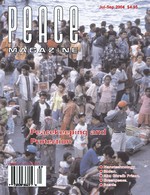
Peace Magazine Jul-Sep 2004, page 4. Some rights reserved.
Search for other articles by PMag staff here
We go to press on June 29, the day after Canada went to the polls. From the standpoint of our editorial policy, the central issues in this election had to do with foreign and military policies. As usual, international relations did not command much attention from candidates but there were disagreements over ballistic missile defence -- more generally over the weaponization of space via some version of "Star Wars." In the last weeks of the campaign, Prime Minister Martin come out against it. Until late last night, it appeared that the NDP would be in a position to demand this, and other, commitments as a price of cooperating with the Liberals.
What a difference one seat can make! By this morning it appeared that the NDP would win only 19 seats -- just one short of holding this powerful position. Instead, Mr. Martin will have to negotiate deals, one by one, with other parties, including the Conservatives, who are far more favorable to such American military plans.
Our fascination with the election has obscured two other important developments. First, the courts have declared that the Bush administration may not deny war prisoners their legal rights, as it has done to supposed terrorists until now. This is a hopeful sign.
Second, the handover to Iraq's interim government took place two days early without hoopla. The does not necessarily warrant much hope, for US-led forces will continue running things for some time to come, in the absence of a significant exit strategy --which even peace politicians can hardly imagine with much conviction.
However, we have gleaned these proposals by Dennis Kucinich and the Friends for a Non-violent World: The US could seek a Security Council resolution placing all foreign troops in Iraq under the UN as peacekeepers, with all US troops leaving by a specified date. The UN would oversee free elections, thereafter placing reconstruction budgets under the sole control of Iraqi ministries and local councils, who could negotiate and dissolve any contracts previously brokered, and manage the oil assets for the Iraqi people. The US would renounce any efforts to privatize Iraq. The "coalition of the willing" would establish a Marshall plan for Iraq and provide long-term financial support for its reconstruction.
The main issue we can see remaining here is that considerable time is require for the formation of political parties and dialogue concerning the country's future. In Bosnia, elections were held precipitously without such preparations, with the result that old nationalist leaders were returned to power. In truth, democracy takes time, but in this emergency, time is exactly what is scarce.

Peace Magazine Jul-Sep 2004, page 4. Some rights reserved.
Search for other articles by PMag staff here